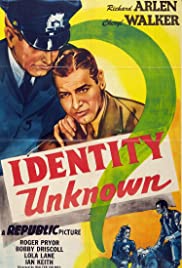
IDENTITY UNKNOWN
US, 1945, 71 minutes, Black-and-white.
Richard Arlen, Cheryl Walker, Roger Pryor, Bobby Driscoll, Lola Lane, Ian Keith, John Forrest, Sarah Padden, Forrest Taylor, Frank Marlowe.
Directed by Water Colmes.
This is quite an earnest drama, a World War II film, acknowledging action in France and American involvement, the repatriation of those wounded in war, issues of amnesia, searching for identity, variation on post-traumatic stress disorder.
The film stars Richard Arlen, veteran of so many action films, a solid and reliable screen presence. He is seen first on a ship from Europe to the United States, recovering from injuries, not knowing who he is, the authorities trying to investigate. There are four dogtags with names which seem to be possibilities for his identity.
The drama of the film is his search for his identity, assuming the name of Johnny March (when Johnny comes marching home again…). For those who want detailed realism, the film has many holes, Johnny impulsively getting off the train with absolutely no luggage and seemingly able to survive, uniform immaculately clean. Then he is able to move from Kentucky to Connecticut, to Chicago, to Iowa without any seeming financial support, documents, and all in a week.
However, putting that aside, the film shows a cross-section of ordinary American society when Johnny goes to try to find which of the four names is his. The first is an encounter with a widow, just six months married, working on the swing shift. When she finds that he does not know the details about her husband, she attempts suicide. However, Johnny rescues her – explanations, forming a bond, falling in love. His second visit brings him to a house where the little boy in the house immediately assumes that Johnny is his father, shows him around the house, his father’s architectural designs, but the woman caring for the little boy does not recognise him and Johnny has to console the boy. There is quite a change in the third attempt at identity, a betting club in Chicago with some rather seedy characters. Again Johnny is not recognised by the proprietor. The dead man’s brother also works there and there is a complication with his stealing $1000 from a gangster to put it on a horse, and then a shooting attempt on the gangster. Johnny looks after the young man, the man saved from being shot by Johnny taking the bullet then offering to cancel the debt, pay for his education.
Film buffs will relish seeing Bobby Driscoll in a very early role, later to appear in The Window and as Jim Hawkins with Robert Newton in Treasure Island.
Johnny assumes, as does the audience, that the last port of call will reveal his true identity. The elderly mother faints when she sees Johnny. However, her husband does not recognise him. They are hospitable, Johnny helps them when they want to auction their house but not want to leave it and he makes a speech so that prospective buyers leave and the house does not go under the hammer.
In the meantime, the widow from Connecticut arrives, Johnny speeds along the roads in a truck, is pursued by the police, has no documents or identity, the MPs then taking him to the authorities where they have identified who he is – asking him some historical questions about dates which he answers and it emerges that he is a professor of history. And single! It emerges that he was not in the house which was bombed where the other four men were found but was a pilot trying to drop food and supplies to the men in the house and who crashed.
A very patriotic film – with some speeches but able to communicate to the audience by showing the range of families, the men going to war, being killed, and the grief of those left behind who have to build on their lives.